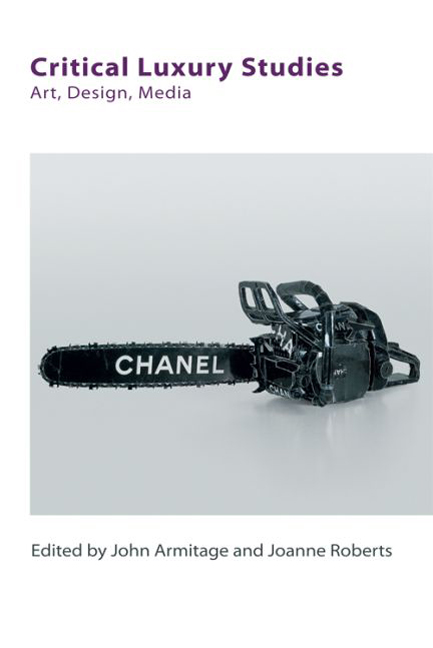Book contents
- Frontmatter
- Contents
- List of Figures
- List of Tables
- Series Editors’ Preface
- Acknowledgements
- Notes on Contributors
- 1 Critical Luxury Studies: Defining a Field
- I CRITICAL LUXURY STUDIES
- 2 Knowing Luxury: From Socio-Cultural Value to Market Price?
- 3 Luxury: A Dialectic of Desire?
- 4 The Luxury Duality: From Economic Fact to Cultural Capital
- 5 ‘Life's Little Luxuries?’ The Social and Spatial Construction of Luxury
- 6 The Object and Art of Luxury Consumption
- II ART, DESIGN, MEDIA
- Index
2 - Knowing Luxury: From Socio-Cultural Value to Market Price?
from I - CRITICAL LUXURY STUDIES
Published online by Cambridge University Press: 23 September 2017
- Frontmatter
- Contents
- List of Figures
- List of Tables
- Series Editors’ Preface
- Acknowledgements
- Notes on Contributors
- 1 Critical Luxury Studies: Defining a Field
- I CRITICAL LUXURY STUDIES
- 2 Knowing Luxury: From Socio-Cultural Value to Market Price?
- 3 Luxury: A Dialectic of Desire?
- 4 The Luxury Duality: From Economic Fact to Cultural Capital
- 5 ‘Life's Little Luxuries?’ The Social and Spatial Construction of Luxury
- 6 The Object and Art of Luxury Consumption
- II ART, DESIGN, MEDIA
- Index
Summary
The purpose of this chapter is to explore how luxury is known. Luxury has had an important role in society throughout the ages. For much of this history, luxury was aligned to the authority of political and social institutions. Since the eighteenth century, when the potential of luxury consumption to enhance social and economic development was advanced by David Hume (1987 [1742]) and Adam Smith (1982 [1776]), its diffusion through society has extended and its contribution to the economy has grown significantly. Indeed, in 2014, the value of the global luxury market exceeded €850 billion, having grown at a rate of 7 per cent on the previous year (D'Arpizio et al. 2014), well above the global rate of economic growth. In the twenty-first century, this luxury market growth is accounted for by increasing incomes in the advanced countries, especially among the wealthy, who have been less affected than most people by the global financial crisis of 2008, and the expanding middle classes in emerging countries. Today, the prevalence of luxury is such that we all have an idea of what it is, in the sense that we associate it with expensive goods and services supplied by well-known brands such as Louis Vuitton, Gucci and Hermès. Yet, the label of luxury is being attached to an increasing number of goods and services, giving producers the capacity to command a substantial price premium. The extended use of the term luxury begs an important question: how do we come to know luxury?
Much attention has been devoted to developing understandings of the place of expert knowledge in the production of luxury artefacts (Tungate 2009; Ricca and Robins 2012). Furthermore, knowledge of the management of luxury brands has grown rapidly in the past decade as the increasing number of books in the area attests (Chevalier and Mazzalovo 2012; Hoffmann and Coste-Maniere 2012, 2013; Kapferer and Bastien 2012; inter alia). In contrast, how luxury is known from a consumer, societal and philosophical perspective has been overlooked. Yet, luxury is often marketed through the promotion of mysterious and ambiguous references to undefined but somehow exclusive qualities.
- Type
- Chapter
- Information
- Critical Luxury StudiesArt, Design, Media, pp. 25 - 46Publisher: Edinburgh University PressPrint publication year: 2016

